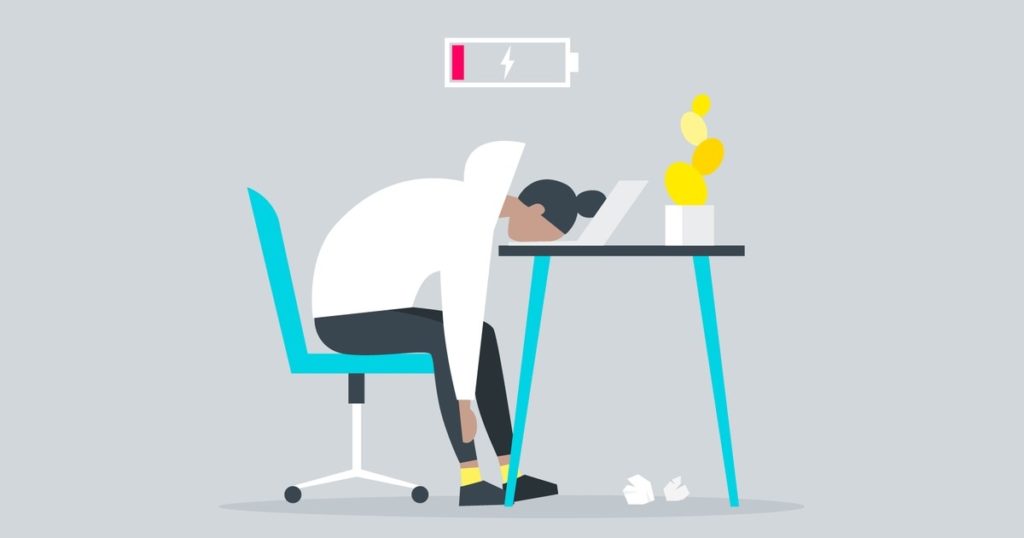
“Work-related stress is common today and is usually regarded as a normal thing. But it can quickly become too much to handle and cause burnout. This is especially true when external factors and challenges are there.”
Have you ever felt completely drained, both emotionally and physically? You may even fear going into the workplace and finding that you are failing to accomplish your targets. Maybe you’ve been put under a lot of stress and strain and are experiencing burnout. Burnout is a huge issue in today’s environment, and it’s one that we should all be trying to fix.
What is Burnout And Why Does It Happen?
Burnout is subjected to physical, emotional, and mental tiredness. This is usually due to continuous and severe stress, which is often related to the job. Individuals who are trying to cope with working stress are at high risk of burning out.
The signs and symptoms are:
- Prolonged tiredness.
- Decreasing levels of performance.
- Sleep disorders and deprivation
Employees that are comfortable at work are more likely to value the company’s core objectives. To help you understand, we’ve outlined each of the factors that contribute to employees burnout.
8 MAJOR FACTORS CAUSING EMPLOYEES BURNOUT
In this section, we will discuss the major reasons for employee burnout at the workplace and how to cope with it.
-
Maintain Reasonable Work Hours
This is a straightforward solution. Burnout can occur when fixed work hours are not followed, whether by employers or employees. Make certain that your workers switch off when required. This process may seem challenging when your work is instantly accessible on your smartphone, but it is critical that you set particular work hours. Encourage your employees to do so, and be flexible about what they can and cannot complete in a day.
-
Encourage work/life balance
As a business owner, you must display a good work/life balance to teach it to your employees. This means that you should ensure that your staff has time to work out, family, and self-care. Work-life balance may also be encouraged at the institutional level. For example, close down early before the holidays to teach the value of family time. Furthermore, allow flexible scheduling to fit individual schedules. Also, be upfront about the needs of a job during the hiring process so that individuals who are hired are on board with the expectations.
-
Not Awarding Any Rewards
Employee burnout can be caused by a lack of financial rewards, but what most businesses ignore is a lack of social rewards (e.g. recognition for a job well done). This lack of acknowledgment devalues both the work and the workers, and it can also influence inner drive (like pride in handling something important well).
-
Encourage your staff to take time away from work
Working long hours, missing lunch, and responding to emails on weekends are all examples of hard work and commitment. While it may be right for some people, it perpetuates the troubling idea that some people should not have a decent work-life balance. Many individuals believe that work should always take preference and even interfere with their personal life, even though this is neither healthy, durable, nor effective.
Employees must take time away from work to prevent burnout. Make sure your employees are aware of this!
-
Let Them Follow Their Passion
People are more inclined to work harder if they are highly motivated. It’s a good idea to create new roles or move competent people to positions in which they are more interested. It can be difficult as a boss to shift about your top employees, especially if you believe they are best suitable for a specific role. Encouraging employees to attain positions for which they are passionate about is always a risk. But, it creates an environment of innovation.
-
Be Flexible
Burnout happens by a combination of factors that become too much for an individual to handle. To help your team stay on top of the expectations of both work and their personal lives, be versatile. Your workers should be able to fit work around their lifestyles. If they need to go to the doctor, or take their car to the mechanic, pick up their children from school, or work at home to make a delivery, they should be able to do that.
Any flexible working arrangements must suit both your company and the employee. You may not be able to provide employees total flexibility over their working hours, but you can still be flexible in your manner.
-
Educate Staff
This process is important since many individuals do not know how to identify burnout signs and symptoms. Prevention is always better than cure. Discuss the symptoms of burnout with your workers during staff meetings. It could also be a good idea to put it in a memo for easy access. It is important to notify the management if they present small signs of burnout, such as stress and trouble sleeping. Moreover, managers can help educate staff on effective stress coping strategies.
-
Practice Open Communication
When information is withheld and open interaction is limited, employee stress can start rising simply because of the unexpected. Managers should make open communication a habit, ensuring staff receive regular, accurate information, know the expectations, and know about their performance measurement scales.
Final Thoughts
Although burnout may hurt both employees and the company, it can be avoided by creating a more open work atmosphere. What is important to remember is that employees who are at risk of burnout need to rebalance their lives, and your company should focus on assisting them and providing them with the tools they need to do so. You can help individuals feel more involved, decrease stress-related health concerns, and create a stronger sense of community inside your company this way.



